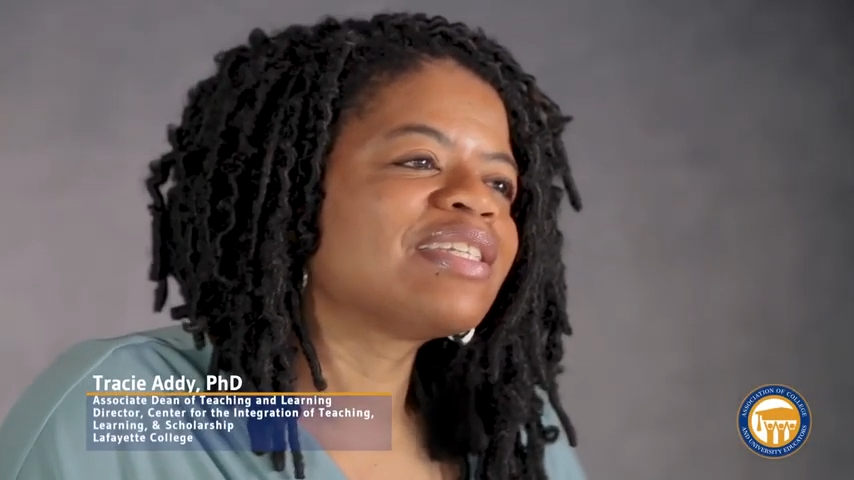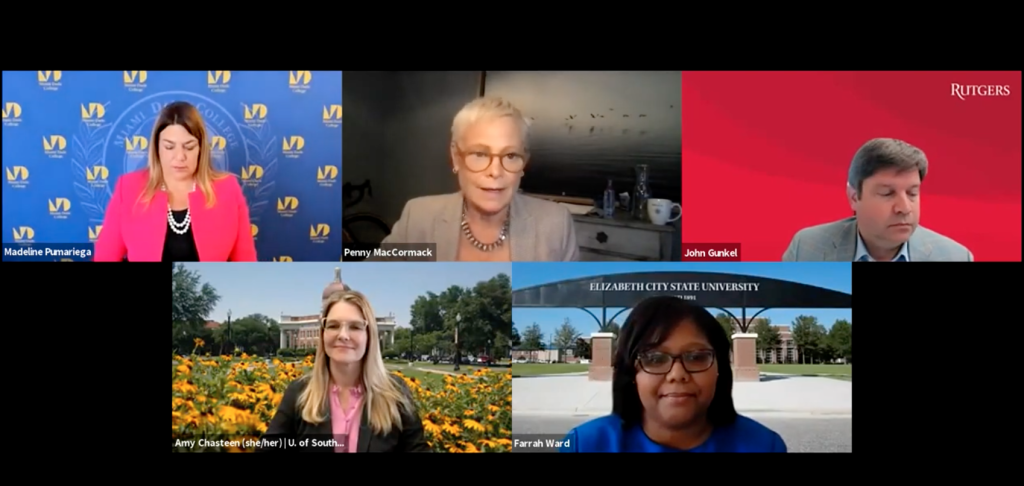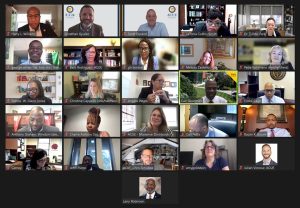“Completely Transformational”: Ohio Faculty Reflect on their ACUE Journey
“It is you, our faculty, who can dismantle the barriers and create the pathways to student success — no work is more important,” Dr. Penny MacCormack, ACUE’s Chief Academic Officer, said to an audience of 122 newly ACUE-credentialed faculty who were joined by their chief academic officers and other administrative leaders. “You used practices that created community, you made sure students were actively involved in their learning, and you made efforts to reach and engage with all of your students, so that no one felt invisible or unseen.”
Thanks to a partnership between the Ohio Association of Community Colleges (OACC) and ACUE, faculty members across nearly all of Ohio’s community colleges—22 colleges in total —had the opportunity to refine their teaching skills and learn how to apply evidence-based practices in the classroom, both virtually and in-person.
Made possible by a grant from Every Learner Everywhere in partnership with Achieving the Dream, the program kicked off at the start of 2021. As demand for the program quickly exceeded capacity, in September 2021, OACC and ACUE expanded their partnership to launch an additional seven cohorts of instructors.
Now, as the year comes to a close, faculty who completed ACUE’s 25-module Effective Online Teaching Practices program in the first wave of cohorts were honored in a pinning ceremony, receiving their certificate in effective college instruction endorsed by the American Council on Education (ACE). At the ceremony, they reflected on their experience.
“I really felt validated as an instructor,” said Sara Burke, Assistant Professor in the School of Nursing and Health
Professions at Owens Community College, who served as both a course facilitator and participant.
Burke talked about experiencing imposter phenomenon in her teaching before the course. “I felt like there was something missing. But taking this course empowered me. I felt like now I had the research to back up what I was doing and new techniques and tools… to do what I love to do.”
She added that her students enjoyed sharing the perspective of learning together and were eager to offer feedback, too.
Burke is among the vast majority of OACC course takers who found the ACUE program pivotal to improving their teaching. Ninety-nine percent reported that the modules were helpful in refining their teaching practice and found the content relevant to their work.
Overall, faculty reported implementing an average of 20 new practices in their own courses over the duration of the ACUE program and that they plan to implement 50 additional practices in the future. Moreover, the course prompted more conversations with colleagues about teaching.
“For me, the course was completely transformational,” said Kathy Renfro, Assistant Professor of Mathematics at Cuyahoga Community College. She found the opportunities to reflect on practices and refine her teaching with colleagues enormously helpful.
“The other added benefit was being an online student myself at a chaotic time,” she said. “It helped me gain a better perspective as an instructor. I definitely don’t have all the answers… but I feel armed and empowered to take my learning to the next step and the next. Isn’t that what we all hope for our students?… that they, too, are lifelong learners?”
Lori Zakel, Interim Provost and Vice President for Instruction, Sinclair Community College, and Lead Faculty Engagement Coach, OACC, encouraged the course completers to pay it forward. “Don’t forget to share what you’ve learned with your colleagues,” she said.
Congratulations to all these dedicated faculty!
Say Thank You With ACUE
Student Career Readiness Starts With Faculty

Faculty Reflection: Teaching Techniques to Build Employability Skills
By Subhadra Ganguli
Over my years as an economics faculty, I have always sought to refine my teaching to help my students learn. In recent years, I have become particularly interested in — and passionate about — strategies that can help develop more career-ready skills.
According to the World Economic Forum, digitization is progressing at a fast rate, and that will have big implications for graduating students who will be expected to adapt to new technologies and the ever-changing workplace. As instructors, we strive to teach in a way that helps students achieve learning outcomes specific to a particular discipline or course. But how can we also make our courses more relevant to students’ career aspirations and create activities that develop students’ career-ready skills?
REPORT: Beyond Classroom Borders: Linking Learning and Work Through Career-Relevant Instruction.
 That’s a question I have explored as a participant in the ACUE program through Bloomsburg University. While group work has always been integral to my courses when it comes to helping my students better understand the principles of microeconomics or macroeconomics, I wanted to know to what extent these collaborative projects could help them develop so-called “soft skills” such as resilience, adaptability, empathy, and integrity.
That’s a question I have explored as a participant in the ACUE program through Bloomsburg University. While group work has always been integral to my courses when it comes to helping my students better understand the principles of microeconomics or macroeconomics, I wanted to know to what extent these collaborative projects could help them develop so-called “soft skills” such as resilience, adaptability, empathy, and integrity.
Using Groups to Ensure Active Learning
Organizing students into small groups is the first step, and it shouldn’t be overlooked. Earlier on in my career, I assumed it would be fine to manage the process, through coerced or random selection. But I’ve learned that taking a step back and enabling students to create their own groups can promote interdependence and shared accountability.
Similar to what is recommended in ACUE’s module on Using Groups to Ensure Active Learning, I encourage students to get to know each other using online discussion boards with prompts to share about their general areas of interest around the study of a country (macroeconomics) or study of a firm (microeconomics). During the pandemic, one of the most challenging aspects of teaching in an online learning environment has been creating student-to-student engagement, but I’ve found that this early step really can build meaningful connections.
Even as face-to-face classes have resumed, I have continued the “tradition” of using virtual discussion boards because they are so effective at cultivating a sense of community in both online and F2F course settings. In addition, ACUE’s module on Providing Clear Directions and Explanations provided a good idea for how to create step-by-step tasks. For a lot of the freshmen in this class, it’s the first time they’re preparing a presentation.
REGISTER: Next course date for PROMOTING ACTIVE LEARNING ONLINE launches on January 22, 2022.
Facilitating Engaging Online Discussions
Soon after formation, groups must work collaboratively to assign roles and responsibilities to each member of the group. Our course’s group presentation typically takes approximately four weeks to prepare. Encouraging students to present their ideas is recommended in the module on Facilitating Engaging Online Discussions. But it’s a great way to create community in my F2F classes as well.
One role, for example, is responsible for organizing and coordinating team activities. But before they even begin to dive into the research and preparation for their chosen topic, students must create and sign an online contract. This process indicates a willingness by all group members to honor their responsibilities. Warren Buffet has famously said that integrity is the most important trait to look for when hiring, but it’s hardly innate. It takes time and practice, and this classroom activity is an opportunity to help students flex their soft-skill muscles.
LEARN MORE: Plan and Facilitate Effective Discussions – ACUE’s Online Teaching Toolkit
Developing Self-Directed Online Learners
After several trials and errors over the past years, I have created a peer evaluation process for students to provide critical feedback on one another’s work. This is a peer-evaluation questionnaire, which is designed to objectively explore various aspects of presentation quality, including delivery and content. This process of peer evaluation stresses the importance of stakeholder views that are now considered essential for real-world business solutions. Finally, all of this is wrapped in the framework of a fair and transparent grading process. Guided by principles that align with ACUE’s module on Developing Self-Directed Online Learners, students learn to use rubrics that help them evaluate their peers’ presentation performances.
Helping students develop career readiness skills isn’t something that should be left to a career center or offered through separate, standalone courses. Embedding this work into our existing courses doesn’t require a complete redesign but rather smaller adjustments or tweaking along the way. The advantage of this approach is that your students will be more likely to see the relevance of your course to their own learning and career aspirations. In my classes, it’s my hope that these group projects become learning experiences that leave invaluable impressions beyond the classroom.
Subhadra Ganguli is an instructor of economics at Bloomsburg University and is in the process of earning her full ACUE Certificate in Effective College Instruction.
What Inclusive Instructors Do

HBCUs Kick Off “Excellence in Online Instruction” Initiative
Presidents, provosts, and project directors from 14 public HBCUs convened last week as the “Excellence in Online Instruction” initiative begins to take root within their campuses. Out of a shared commitment to strengthen the quality and equity of higher education, the Thurgood Marshall College Fund (TMCF) and the Association of College and University Educators (ACUE) have partnered to equip more than 660 faculty with evidence-based online teaching practices, ultimately reaching tens of thousands of students.
“TMCF’s members have made instructional quality a top priority, whether online, in-person, or in a blended format,” noted Dr. Harry L. Williams, TMCF’s president & CEO, when the initiative launched through generous support from the ECMC, Bank of America, and Sam’s Club Foundations and the Partnership for Education Advancement (formerly Education Finance Institute).
Leaders across the 14 participating institutions are committed to making effective teaching central to their student success efforts. “Through this partnership, HBCUs are coming together around a critical imperative: to put teaching at the heart of student success,” said Scott Durand, ACUE’s CEO. “A focus on measurably improving teaching and learning is one of the strongest signals an institution can send to its faculty, students, and communities.”
Two cohorts of 30 full-time faculty members across various programs, paired with mentors, were selected to take part in the one-year training course. Delivered by ACUE faculty, the 25 modules focus on the pedagogical aspects of online teaching. The faculty are learning how to distinguish between the competent technical delivery of a course and being an effective teacher online, including being innovative, engaging, and compelling.
The group represents a “powerful network” for insight to “elevate and share learnings” across HBCUs and minority-serving institutions, said Dr. Steve Michael, Provost, and Dr. Eun Mi Park, Executive Director for Faculty Development, of the Charles Drew University of Medicine and Science in Los Angeles.
Florida A&M University’s President Dr. Larry Robinson and Associate Provost Dr. Genyne Boston commented on the importance of integrating faculty learning opportunities into the professional incentives that matter. As examples, Boston mentioned action-research publication opportunities and greater consideration of teaching effectiveness in promotion and tenure. Such holistic thinking aligns to approaches recommended in a new faculty engagement toolkit, published by ACUE with the Education Commission of the States and Strong Start to Finish.
Dr. Carl Pettis, Provost of Alabama State, emphasized the need to respect faculty autonomy by explaining how evidence-based teaching practices—relevant across the professoriate—are proven approaches for how to teach most impactfully and steer clear of what faculty, departments, and disciplines decide to teach.
This impressive network of leaders will gather quarterly over the coming year to share successes, learn from challenges, and problem-solve together, in parallel to the work of their faculty members who are currently earning their ACUE credential in effective online teaching practices.

What Inclusive Instructors Do: Q&A With Tracie Addy
 For Tracie Addy, inclusive teaching is essential. Historically, inclusive teaching hasn’t always been at the forefront of conversations around what good teaching entails. Addy’s research focus is to advance the conversation so that inclusive teaching is better understood, effectively implemented, and grounded in evidence.
For Tracie Addy, inclusive teaching is essential. Historically, inclusive teaching hasn’t always been at the forefront of conversations around what good teaching entails. Addy’s research focus is to advance the conversation so that inclusive teaching is better understood, effectively implemented, and grounded in evidence.
“Inclusive teaching is excellent teaching. It shouldn’t be something that’s just tacked on,” says Addy, a featured expert in ACUE’s modules for designing student-centered courses. In this interview, she discusses her research, which has been published in a new book called What Inclusive Instructors Do.
NOW ENROLLING: Inclusive Teaching for Equitable Learning
Tell us about your research and book, What Inclusive Instructors Do.
What Inclusive Instructors Do is essentially a guidebook for instructors across disciplines and institution types to learn how to be more equitable and inclusive in their teaching. It’s grounded in the literature around belonging and equity. And it features the voices of instructors who have implemented inclusive teaching approaches.
The first part focuses on the significance of inclusive teaching. Why do we do it? The next part focuses on specific inclusive teaching practices. And the third part presents the Who’s in Class? Form, which is a tool to help instructors increase their awareness of the diverse assets that their students bring to the classroom.
Why is inclusive teaching something worth focusing on?
Historically, inclusive teaching and equitable learning have been afterthoughts in conversations about what good teaching entails. This is especially the case in higher education. We want to move inclusion and equity to the forefront with a message that inclusive teaching is excellent teaching. It shouldn’t be something that’s just tacked on.
We initially sought to study the predictors for and barriers to the implementation of effective inclusive teaching approaches. More broadly, we want a comprehensive understanding of what instructors think about inclusive teaching practices that are grounded in research.
You recently published a research article on “what really matters” for the implementation of equitable and inclusive teaching approaches. What are some key highlights?
One interesting thing centered around faculty knowledge as a predictor of inclusive teaching. When faculty completed our survey, those who reported having more knowledge of inclusive teaching practices were more likely to say that they implemented the practices in their teaching. These findings support the idea that the implementation of inclusive teaching approaches begins with faculty developing a knowledge base of different practices that are equitable and can foster students’ sense of belonging.
We also asked faculty about the barriers that existed in advancing inclusive teaching at their institutions. On a personal level, one common barrier was a fear of offending students. Other responses were a lack of awareness of the diverse identities and attitudes that their students bring to class. In some cases, we saw responses where faculty just didn’t want to change their practices.
How can institutions address these barriers?
Well, at the institutional level, one barrier that emerged from the responses was the number of resources being devoted to inclusive teaching. Many felt there was simply a need for more discussions and a commitment to it at the institutional level. That included anything from expanding professional development opportunities to creating incentives that are supported by the administration to actually change instructional practices.
The most effective educational development opportunities are sustained and ongoing. They allow instructors to be part of a community of practice where they are engaged in a process of implementing various instructional practices in their classes. So faculty learning communities that explore one particular topic at a time such as inclusive teaching, engage with it consistently in different ways, discuss and brainstorm strategies, and then actually apply them in the classroom. In-person or online, I think this community aspect to intentionally encourage interaction, is really meaningful.
Why is partnering with students an important piece of teaching and learning?
One issue I’ve had with some of the work that we do is that we don’t necessarily try to hear everybody’s voice. We’re designing courses and instruction, but we don’t always get feedback from the recipients of that work. Collecting feedback from students is important. When we talk about things like inclusion and giving students more of a voice, how are we actually providing opportunities for students to share their perspectives in ways that will help us improve our teaching? So, at my institution, we run an Inclusive Instructors Academy, a semester-long program where faculty set inclusive teaching goals and work directly with students.
It’s been successful because it’s a space where faculty feel like they can get actual perspectives from students that they can use to make their teaching more inclusive. For students, it’s an opportunity to be a partner in their college’s process for improving teaching and learning.
So if we’re going to enact a strategy that we think is inclusive, we should ask our students if it really is. They’re the ones we’re doing this for, so they’re going to be the people to provide feedback.
Addy is Associate Dean of Teaching and Learning at Lafayette College. Dr. Addy directs the Center for the Integration of Teaching, Learning, and Scholarship and serves in other leadership capacities.
ACE President: Quality Teaching is at the Heart of Student Success

A “Future Proof” Campus Starts With Quality Teaching
Higher education is in a moment of immense change. Our partners know that in order to emerge stronger and ready for the future, faculty must be equipped with the evidence-based teaching practices proven to increase student engagement, achievement, and persistence to graduation.
Recently, ACUE hosted a discussion on how higher education institutions can become “future proof” by focusing on quality teaching. The panel featured higher education leaders from campuses across the country: Amy Chasteen, PhD, The University of Southern Mississippi; Farrah J. Ward, PhD, Elizabeth City State University; Madeline Pumariega, Miami Dade College; and John Gunkel, PhD, Rutgers University-Newark. It was moderated by Penny MacCormack, EdD, Chief Academic Officer, ACUE.
By embracing a holistic approach, each of our panelists are ensuring faculty are prepared to create inclusive learning environments, help students persist, and learn more. As a result, faculty are able to respond to the shifting demands on institutions and the needs of students, with proven impact: DFW rates are down, course completion is up, and grades have improved.
Key Takeaways from the Discussion:
Faculty are central to student success efforts — and they must be ready for anything.
“This past year, what’s been clear is that our faculty have been the unsung heroes,” President Pumariega said. “What a crucial role our faculty play in our institutions.”
At Miami Dade College (MDC), she explained, the faculty became the “conduit” of student support, both academically and socially. According to Pumariega, their long-standing partnership with ACUE — now in its sixth year and on track to credential 900 faculty — is making a big difference.
“If you’re all learning in the same area, you start thinking and innovating,” she explained.
Dr. Chasteen spoke about how the University of Southern Mississippi (USM) launched an “all-out effort” focused on student success back in 2015. The university invested in ACUE in 2016 and then went on to create the ACUE Faculty Development Institute, through which faculty can undertake the rigorous process of becoming ACUE Fellows. “It’s building a sense of faculty community.”
Meanwhile, Elizabeth City State University (ECSU) is engaged in a variety of student success initiatives. Many of our instructors were still focused on lecturing,” Dr. Ward said. “We realized we had to get inside the classroom.”
ECSU began working with ACUE in 2019 and “we really saw great success.”
Rutgers University-Newark (RU-N), too, revitalized and invested heavily in its student success efforts, with faculty at the center. “Initially, we focused more on the institution than the faculty,” Dr. Gunkel said. “Then, we started incorporating teaching more heavily.”
He discussed the launch of the P3 Collaboratory — pedagogy, public scholarship, and professional development — in which the institution worked closely with faculty to equip them with pedagogical practices, partnering with ACUE. The Collaboratory has overseen nine ACUE cohorts and as well as seven microcredential cohorts.
Celebrate and lift up faculty.
The panelists underscored the importance of recognizing faculty for their efforts.
Dr. Chasteen noted that, as students performed better, faculty would be rewarded. Now, with one-sixth of faculty ACUE Certified at USM, “We’re having great success.”
“We know how important they are to our institution,” Pumariega said. She added that faculty who demonstrate a commitment to teaching, such as becoming ACUE Certified, are recognized through various means. For example, they can apply for grants to improve student success and enhance pedagogy.
Dr. Ward, too, spoke of rewarding faculty through measures like targeting mini-grants to ACUE Certified faculty. They are also recognized at ECSU’s Faculty Institute and receive pins and certificates. This past year, the institution had to adapt and celebrated faculty achievements virtually.
Listening to faculty is key to overcoming challenges.
“We found a lot of success in allowing faculty to be the experts for other faculty,” Dr. Ward said. She encouraged institutions to listen to faculty and what they need. At ECSU, she explained, faculty have “a lot of input” in workshops and programming.
In fact, the pandemic “helped our institution accelerate” and “brought faculty together,” she said.
Dr. Gunkel explained that there’s a balance between engaging faculty and providing support, commenting that measures like the P3 Collaboratory have provided faculty with a place to problem-solve and come together.
“What you want to do is strategically engage people who won’t automatically jump at the chance,” Dr. Chasteen said. “Make them understand they’ll be rewarded.”
It’s important, she said, to find ways to make the importance of pedagogy resonate.
“I’m hopeful that faculty learned things about themselves [during the pandemic] and developed a growth mindset,” she added. “There are silver linings to the pandemic.”
Pumariega encouraged institutions to ask faculty what they need, rather than making assumptions. “Provide them with the opportunity and space. Elevate and amplify the work within the institution.” This, the panelists agreed, is critical to “future-proofing” higher education and tackling the challenges to come.
We invite you to watch the recording of the conversation, which is also closed-captioned.
The Association of College and University Educators (ACUE) is here to be your partner in ensuring every student can succeed through exceptional teaching, no matter what the future brings.
If you’re interested in learning more about how to bring ACUE programs to your campus, please connect with us.

